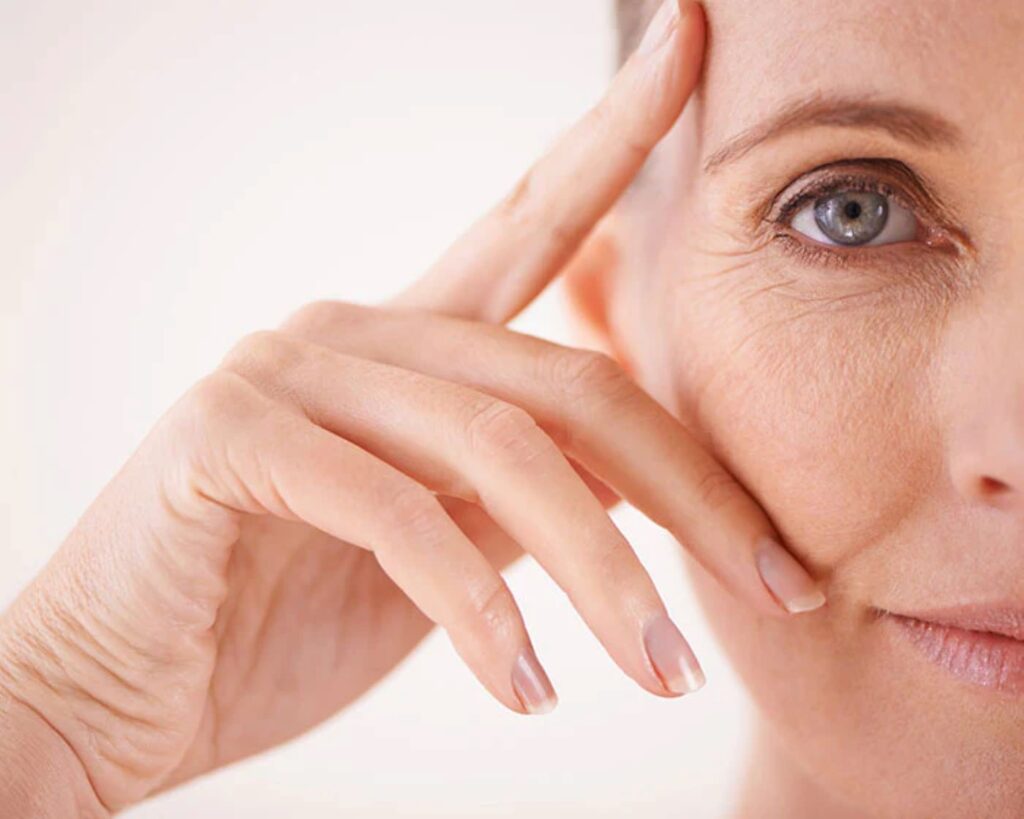Health
What Are the First Signs of Menopause?
Menopause, which is typically celebrated as an important milestone in a woman’s life, signifies the end of menstrual cycles and the reproductive years.
While menopause is a natural and unavoidable process, it can cause a variety of physical, emotional, and hormonal changes. Understanding the early indications and symptoms of menopause allows women to negotiate this transition with confidence and clarity.
In this article, we’ll look at the early signs of menopause, throwing light on the subtle indicators that signal the start of this transforming phase. From irregular menstrual cycles to hot flashes, mood swings, and more, we explore the various manifestations of menopause, drawing on scientific evidence, expert perspectives, and personal experiences.
Join us on this fascinating journey if you’re approaching menopause or simply want to understand the signs and symptoms that may be ahead. By demystifying the early signs of menopause, we hope to provide women with knowledge, compassion, and support as they navigate this normal and unavoidable transition.
Early Signs of Menopause
Menopause is a natural process that ends a woman’s reproductive years. It often occurs between the ages of 45 and 55, but it can develop sooner or later. Menopause is defined by a drop in hormone levels, which can result in a variety of symptoms. In this section, we’ll talk about the early indicators of menopause.
Irregular Periods
Irregular periods are one of the first indicators of menopause. As hormone levels fluctuate, periods may become shorter or longer, lighter or heavier, or stop entirely. This can be a normal part of the menopause process, but it can also indicate another illness, such as thyroid issues or polycystic ovarian syndrome (PCOS). It is critical to consult a doctor if you have irregular periods.
Hot Flashes and Night Sweats
Common menopausal symptoms include hot flashes and nocturnal sweats. Hot flashes are abrupt feelings of warmth that can produce perspiration, flushing, and a racing pulse. Night sweats are hot flashes that occur while sleeping, causing profuse perspiration and discomfort. These symptoms can be moderate or severe and might persist for years.
Mood Changes
Menopause is also characterized by mood swings. Women with fluctuating hormone levels may experience mood swings, anger, anxiety, or depression. These symptoms might be slight or severe, affecting a woman’s quality of life. If you are experiencing mood swings, you should consult your doctor.
Vaginal Dryness and Discomfort
Vaginal dryness and pain are common menopausal symptoms. As hormone levels fall, the vaginal tissues may become thinner, drier, and less elastic. This might induce sex-related discomfort, itching, burning, or irritation. It may also raise the risk of urinary tract infections. There are therapies available to alleviate these symptoms, so talk to your doctor.
In conclusion, the early indicators of menopause differ from woman to woman, although they are frequent. If you are having any of these symptoms, consult a doctor. They can assist you in understanding what’s going on and suggest remedies to alleviate your problems.

Physical and Emotional Changes
Menopause is a natural biological process that ends a woman’s reproductive years. It is a gradual process that may take years to finish. During this time, a woman’s body goes through numerous physical and emotional changes. These changes can be unique to each woman, but some of the most frequent are listed here.
Changes in Libido
One of the earliest signs of menopause is a decrease in libido or sexual desire. This could be attributed to a drop in estrogen levels, which can induce vaginal dryness and pain during intercourse. It could also be attributed to the emotional changes that many women go through at this period, such as mood swings and despair.
Sleep Disturbances
Many women have problems sleeping throughout menopause. This could be the result of hot flashes, nocturnal sweats, or other physical symptoms. It could also be attributed to the emotional changes that many women go through at this period, such as anxiety and stress.
Weight Gain and Metabolism
Menopause is also associated with weight gain and metabolic abnormalities. This could be attributed to a drop in estrogen levels, which causes the body to accumulate extra fat. It could also be attributed to lifestyle changes, such as a reduction in physical exercise. Women can combat weight gain by eating a nutritious diet and exercising regularly.
To summarize, menopause is a normal process that can produce many physical and emotional changes in a woman’s body. These changes can be unique to each woman, but some of the most prevalent include libido fluctuations, sleep difficulties, and weight gain. Women can manage these changes by living a healthy lifestyle and getting medical assistance when needed.
Health Considerations During Menopause
Menopause is a natural biological process that ends a woman’s reproductive years. Hot flashes, vaginal dryness, and mood changes are some of the symptoms associated with the menopause transition. However, it is also vital to examine the potential health consequences of menopause, notably in terms of osteoporosis, heart disease, and urinary problems.
Osteoporosis Risk
Osteoporosis is a disorder in which bones become weak and brittle, increasing the likelihood of fractures. Women are at an increased risk of getting osteoporosis after menopause due to a decrease in estrogen levels. To lower the risk of osteoporosis, healthcare providers may recommend bone density tests as well as lifestyle adjustments including frequent exercise and a calcium-rich diet.
Heart Health
Heart disease is the biggest cause of mortality among women in the United States, and menopause may raise the risk of acquiring the condition. Estrogen protects the heart, and lower estrogen levels during menopause may lead to an increased risk of heart disease. To lower the risk of heart disease, healthcare providers may advise patients to adopt a heart-healthy diet and engage in regular physical activity.
Urinary Issues
Menopause may also raise the risk of urinary tract infections and incontinence. The decrease in estrogen levels might alter the urinary tract, making it more susceptible to infection. Incontinence, or loss of bladder control, can also increase after menopause. To address these concerns, healthcare practitioners may offer pelvic floor exercises as well as lifestyle adjustments such as limiting coffee and alcohol consumption.
In conclusion, menopause is a natural process that may be accompanied by a variety of signs. However, it is also vital to examine the potential health consequences of menopause, notably in terms of osteoporosis, heart disease, and urinary problems. Healthcare providers can advise on lifestyle changes and other measures to help minimize the risk of certain illnesses.

Navigating Menopause with Professional Help
Menopause is a natural biological process that can result in significant physical and emotional changes in a woman’s life. While some women may have modest symptoms, others may have severe symptoms that greatly impair their quality of life. Seeking professional treatment can help women navigate menopause and manage their symptoms more effectively.
When to See a Doctor
If a woman suffers any of the following symptoms, she should speak with a healthcare expert.
- Irregular periods
- Heavy bleeding.
- Vaginal hemorrhage following menopause
- Hot flashes that disrupt daily activity.
- Night sweats that disturb sleep.
- Vaginal dryness or pain during intercourse.
- Problems sleeping
- Mood changes, such as irritation, anxiety, or depression.
A healthcare expert can assess a woman’s symptoms and provide appropriate treatments to manage them.
Hormone Therapy and Alternatives
Hormone therapy is a popular therapeutic option for menopausal symptoms. It entails taking estrogen and progesterone to supplement hormones that the body no longer makes. Hormone therapy can help with hot flashes, nocturnal sweats, and vaginal dryness.
However, hormone therapy may not be appropriate for everyone. Women with a history of breast cancer or blood clots should avoid hormone therapy. Furthermore, hormone therapy may raise the risk of stroke, heart attack, and blood clots.
Women who are unable or unwilling to take hormone therapy may investigate other treatments such as antidepressants or vaginal estrogen. Antidepressants can reduce hot flashes and enhance mood, whereas vaginal estrogen helps alleviate dryness and pain during sex.
In conclusion, managing menopause can be difficult, but getting professional assistance can help make the transition easier. Women experiencing menopausal symptoms should consult a healthcare expert to evaluate their signs and give appropriate care.
Conclusion
As we conclude this article about the early signs of menopause, it becomes clear that this changing journey includes a wide range of physical, emotional, and hormonal changes. Each woman’s menopausal experience is unique and intensely personal, ranging from slight changes in monthly cycles to more significant symptoms like hot flashes and mood swings.
By equipping ourselves with knowledge and understanding of the early indicators of menopause, we can help women manage this change with confidence and resilience. Seeking support from healthcare professionals, embracing self-care routines, and encouraging open discussion regarding menopause-related concerns can all help to reduce uncertainty and increase general well-being during this stage of life.
While menopause may signal the end of one chapter, it also ushers in a new and transforming adventure. Let us approach this transformation with curiosity, compassion, and a desire to explore ourselves, embracing change with grace and resilience. Together, we can negotiate the intricacies of menopause with courage and empowerment, coming out the other side with a better awareness of ourselves and the inherent beauty of this natural process.
Trusted Health, Wellness, and Medical advice for your well-being



